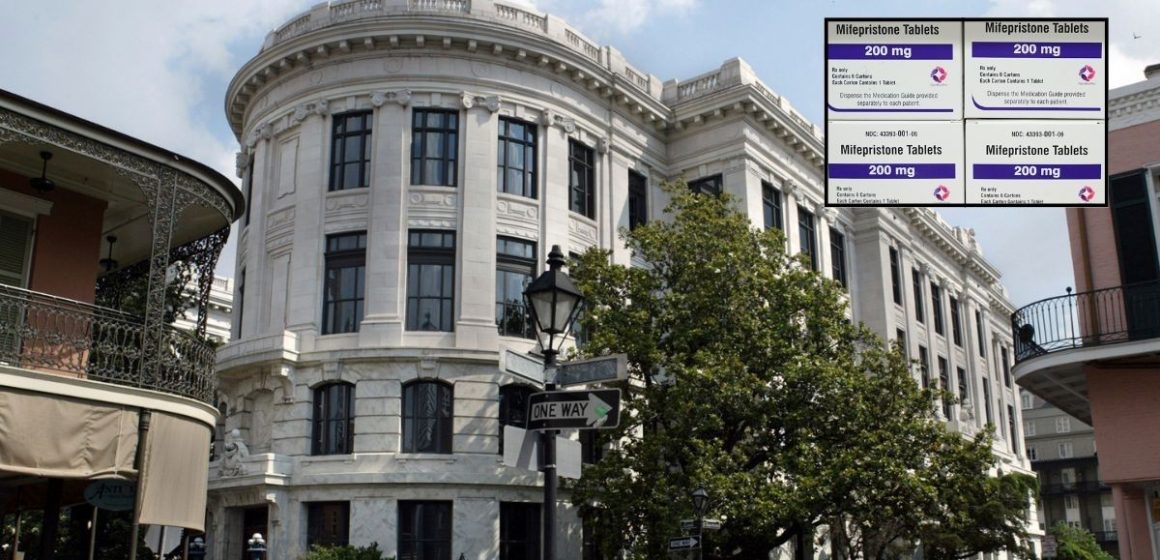A group of Louisiana health care providers and reproductive rights advocates are challenging the state’s unprecedented action of classifying abortion pills mifepristone and misoprostol to the state’s list of controlled substances.
Gov. Jeff Landry, a Republican, signed Louisiana Act 246 into law in May — a choice which effectuated the most extreme legal action yet taken on the drugs. Under the law, the two medications, which have been approved by the U.S. Food and Drug Administration (FDA) for more than two decades, are now classified as Schedule IV drugs. The classification puts mifepristone and misoprostol on part with certain painkillers and mood-altering medications that merit greater oversight due to their potential for abuse or dependence.
Birthmark Doula Collective — a nonprofit reproductive health care organization — along with a doctor, a pharmacist, and a group of women filed suit in state court in Baton Rouge on Thursday challenging the law, which they say delays lifesaving treatment to people experiencing obstetric emergencies. The plaintiffs also point out that the drugs in question have uses other than abortion.
In their complaint, the plaintiffs argue that the reclassification of mifepristone and misoprostol will have little impact on abortion access as Louisiana already has a near-total ban on abortions.
“Instead, the harmful impacts of the statute’s hasty enactment will be felt primarily by people carrying pregnancies to term, people experiencing miscarriages, and people with a wide range of medical conditions unrelated to pregnancy who rely on these safe and effective medications to treat their conditions,” the plaintiffs argued.
The 52-page complaint spelled out exactly how those people would be harmed.
For example, it explained that misoprostol is commonly used to treat postpartum hemorrhage, which can be “as severe and dangerous as a gunshot wound.” However, with the new classification, hospitals would be forced to store the drug in a secure location, thereby delaying access to those who critically need it.
“Hundreds of healthcare providers have expressed serious concerns about the impact that Act 246 will have on their practice and on maternal health outcomes in Louisiana, a state that already has one of the highest rates of maternal mortality in the nation,” the plaintiffs asserted.
They also pointed out that in the years since the Federal Food and Drug Administration (FDA) approved misoprostol and mifepristone — 36 and 24 years, respectively — there has been no evidence that the drugs are physically or psychologically addictive.
“Instead, there is consensus in the medical, public health, and drug regulation communities that neither drug meets the criteria for scheduling — neither the federal Drug Enforcement Authority nor any other state in the country classifies, or has ever classified, misoprostol or mifepristone as a controlled dangerous substance,” said the filing.
Among the plaintiffs are Nancy Davis and Kaitlyn Joshua, who say they were denied medical care due to the restrictions on the two drugs. Davis said she was forced to travel 1,500 miles for proper treatment when, at 11 weeks of pregnancy, she learned that there was no chance her fetus would survive. Davis said that despite the termination of her pregnancy being medically indicated and not falling within the definition of abortion under Louisiana law, the drug restrictions prohibited her hospital from providing her care.
Similarly, Joshua said she was refused treatment for a miscarriage when she went into labor 11 weeks into her pregnancy. Joshua said she was turned away from two emergency rooms instead of being provided medication to treat her miscarriage.
The plaintiffs ask the court to strike down the statute as violative of multiple sections of the Louisiana Constitution.
“Access to safe, timely care is essential to reducing maternal mortality, especially for Black women, who face the highest rates of life-threatening complications,” said Birthmark Doula Collective in a statement. “This restrictive law endangers lives and amplifies health disparities, especially in a state already grappling with maternal health inequities.”
Mifepristone has been at the center of several recent legal battles after Donald Trump-appointed U.S. District Judge Matthew J. Kacsmaryk ordered the FDA to revoke approval of mifepristone. Kacsmaryk’s order launched a nationwide debate over the consequences of allowing a federal judge to second guess the FDA’s scientific judgment regarding a medical regulations.
The U.S. Supreme Court unanimously reversed the ruling on the issue of standing. However, Missouri, Kansas, and Idaho have now sued the FDA alleging that the agency has put women at risk by allowing them to receive abortion drugs via mail. The case is now before the same Texas judge who initially ordered the FDA to revoke its approval.
You can read the full complaint in the current challenge to Louisiana’s law here.
Law&Crime reached out to Landry’s office for comment, but did not immediately receive a response.
Have a tip we should know? [email protected]
Note: Thank you for visiting our website! We strive to keep you informed with the latest updates based on expected timelines, although please note that we are not affiliated with any official bodies. Our team is committed to ensuring accuracy and transparency in our reporting, verifying all information before publication. We aim to bring you reliable news, and if you have any questions or concerns about our content, feel free to reach out to us via email. We appreciate your trust and support!


